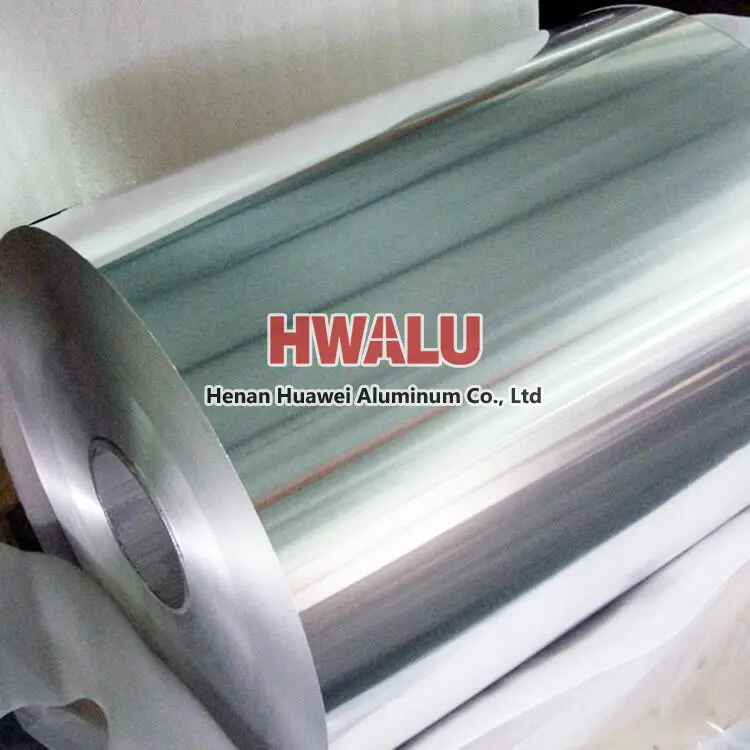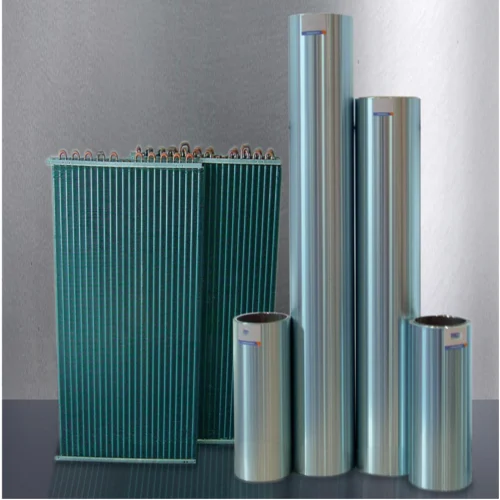What is aluminum foil for baking? Aluminum foil for baking is a type of aluminum foil that is commonly used in cooking and baking to wrap, cover, or line various types of food items. It is made from a thin sheet of aluminum that is rolled out and then processed through a series of rollers to achieve the desired thickness and strength. Aluminum foil for baking is typically designed to be non-stick and heat-res ...
Basic parameters of aluminum foil for food packaging Thickness: 0.006-0.2mm Width: 20-1600mm Material state: O, H14, H16, H18, etc. Fields of application: packaged cooked food, marinated products, bean products, candy, chocolate, etc. What properties does aluminum foil use for food packaging bags? Foil has outstanding properties of impermeability (especially for oxygen and water vapor) and shading, an ...
What is AC aluminum foil? Air conditioning aluminum foil, often called AC foil or HVAC foil, is a type of aluminum foil used in the heating, ventilation and air conditioning (HVAC) industry. Air-conditioning aluminum foil is usually used to make heat-conducting fins for air-conditioning heat exchange and air-conditioning evaporators. It is one of the important alloys used in air conditioning manufacturing raw ma ...
What is Extra-heavy duty aluminum foil Extra-heavy duty aluminum foil is a type of aluminum foil that is thicker and more durable than standard or heavy-duty aluminum foil. It is designed to withstand higher temperatures and provide extra strength, making it suitable for more demanding applications in the kitchen and beyond. Extra-heavy duty aluminum foil common alloys The common alloy used for extra-heavy ...
Alloy parameters of aluminum foil for cups Aluminium foil for cups is usually made of aluminium alloy materials with good processability and corrosion resistance, mainly including 8000 series and 3000 series. --3003 aluminum alloy Alloy composition Al 96.8% - 99.5%, Mn 1.0% - 1.5% Physical properties density 2.73g/cm³, thermal expansion coefficient 23.1×10^-6/K, thermal conductivity 125 W/(m K), e ...
What is aluminum foil for composite foil Aluminum foil for composite foil is an aluminum foil product used to make composite materials. Laminated foils usually consist of two or more layers of films of different materials, at least one of which is aluminum foil. These films can be bonded together using heat and pressure to form composites with multiple functions. Advantages of aluminum foil for composite foil ...
Product name: 8011 aluminum foil roll ID: 76MM, MAX ROLL WEIGHT: 55kg ITEM SPECIFICATION (MM) ALLOY / TEMPER 1 0.015*120 8011 O 2 0.012*120 8011 O 3 0.015*130 8011 O 4 0.015*150 8011 O ID: 76MM, MAX ROLL WEIGHT: 100 kg 5 0.015*200 8011 O
Aluminum foil is generally considered safe to use for cooking, wrapping, and storing food. It is made from aluminum, which is a naturally occurring element and is one of the most abundant metals on Earth. Aluminum foil is approved by regulatory agencies, such as the U.S. Food and Drug Administration (FDA), for use in food packaging and cooking. However, there are some concerns about the potential health risks ...
The main alloying elements of 6063 aluminum alloy are magnesium and silicon. It has excellent machining performance, excellent weldability, extrudability, and electroplating performance, good corrosion resistance, toughness, easy polishing, coating, and excellent anodizing effect. It is a typically extruded alloy widely used in construction profiles, irrigation pipes, pipes, poles and vehicle fences, furniture ...
Aluminum foil is typically thinner than aluminum coil. Aluminum foil is typically available in various thicknesses, ranging from as thin as 0.005 mm (5 microns) up to 0.2 mm (200 microns). The most commonly used thicknesses for household aluminum foil are around 0.016 mm (16 microns) to 0.024 mm (24 microns). It is commonly used for packaging, cooking, and other household purposes. On the other hand, alumin ...
What is aluminum-free deodorant? Aluminum-free deodorant is a cosmetic or daily necessities that uses natural plant extracts, essential oils and other ingredients to suppress and eliminate body odor. Its distinctive feature is that it does not contain chemical ingredients harmful to the human body such as aluminum salts. Mainly achieve deodorizing effect through other natural or safe ingredients Do aluminum-f ...
It is generally believed that the single-sheet rolling speed of the aluminum foil should reach 80% of the rolling design speed of the rolling mill. Danyang Aluminum Company introduced a 1500 mm four-high irreversible aluminum foil roughing mill from Germany ACIIENACH. The design speed is 2 000 m/min. At present, the single-sheet aluminum foil rolling speed is basically at the level of 600m/miT, and the domestic s ...










